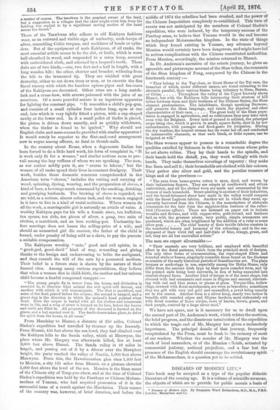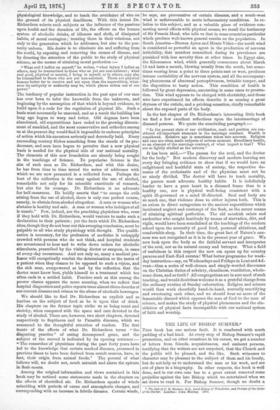DISEASES OF MODERN LIFE.* Tars book may be accepted as
a type of the popular didactic literature of the coming age. It is a volume of scientific sermons, the objects of which are to provide for public morals a basis of
* Diseases of Modern Life. By Benjamin Ward Richardson, M.D.,11.A., Fa& London: Macmillan and Co.
physiological knowledge, and to teach the avoidance of vice on he says, are provocative of certain diseases, and a south-west the ground of its physical deadliness. With this intent Dr. Richardson selects such subjects as the influence of the passions upon health and the duration of life, the effects on the human system of alcoholic drinks, of idleness and sloth, of dissipated habits, of moral contagion ; treating them in their relations, not only to the generation which he addresses, but also to the pos- terity unborn. His desire is to eliminate sin and suffering from the world, by exposing and removing the causes of disease, and by directing the attention of the public to the study of physical science, as the means of attaining moral perfection :—
" What evil I inflict on myself," he writes, "what injury I inflict on others, may be transmitted to those who as yet are non-existent ; what real good, physical or mental, I bring to myself, or to others, may also be transmitted to those who are yet non-existent. These are physical lessons better far to receive and act upon than the superstition, what- ever its antiquity or authority may be, which places action out of our power."
The tendency of popular instruction in the past ages of our race has ever been to infer the knowable from the unknown, and beginning by the assumption of that which is beyond evidence, to build upon it a code for the regulation of physical life. Such a basis must necessarily be unsound, and as a result the building has long ago begun to warp and totter. Old dogmas have been abandoned, old superstitions have ceded to the growing discern- ment of mankind, and the most conservative and orthodox among us at the present day would find it impossible to endorse principles of action which his ancestors seriously and devotedly held. Every succeeding century filches something from the creeds of its pre- decessor, and men have begun to perceive that a new physical basis is needed for the physical side of our national morality. The elements of this new foundation are already being sought in the teachings of Science. To popularise Science is the aim of such men as Dr. Richardson, and with this desire, he has from time to time issued the series of addresses with which we are now presented in a collected form. Perhaps the best of the collection is the essay against the use of alcohol, remarkable not only for its scientific exactitude of research, but also for its courage. Dr. Richardson is no advocate for half-measures. He boldly asserts that " to escape the evils arising from the use of alcohol, there is only one perfect course, namely, to abstain from alcohol altogether. A man or woman who abstains is healthy and safe. A man or woman who indulges at all is unsafe." Few, indeed, are the practising physicians who, even if they hold with Dr. Richardson, would venture to make such a declaration to their patients ; yet the facts which Dr. Richardson cites, though they do not bear out this sweeping conclusion, must be palpable to all who study physiology with thought. The qualifi- cation is necessary, for the profession of medicine is unhappily crowded with persons who do not think, and hospital students are accustomed to hear and to write down orders for alcoholic stimulants, prescribed by the visiting doctor or surgeon, in cases of every-day occurrence. And not only so, many a medical pro- fessor will energetically combat the determination or the tastes of a patient when they chance to be opposed to such a regime, and the sick man, overpowered at last by the reflection that the doctor must know best, yields himself to a treatment which too often ends in a settled habit. Practice such as this among the poorer classes appears the more amazing, when we reflect that hospital diagnostics and police reports trace almost three-fourths of our current diseases and crimes to the abuse of alcoholic beverages.
We should like to find Dr. Richardson as explicit and as fearless on the subject of food as he is upon that of drink.
His chapters on the former topic strike us as being scant and sketchy, when compared with the space and care devoted to the study of alcohol. There are, however, two short chapters, devoted respectively to Septinous and to Parasitic diseases, which we commend to the thoughtful attention of readers. The first treats of the effects of what Dr. Richardson terms " the disgusting practice" of eating decomposed game, and the subject of the second is indicated by its opening sentence :— " The researches of physicians during the past forty years have led to the knowledge that certain marked diseases, presumed in previous times to have been derived from occult sources, have, in fact, their origin from animal foods." The perusal of what follows will, we doubt not, much astonish and alarm the epicure in flesh-meats.
Among the original information and views contained in this book may be noticed some statements made in the chapters on the effects of electrified air. Dr. Richardson speaks of winds coinciding with periods of ozone and atmospheric changes, and corresponding with an increase in febrile diseases. Certain winds, physiological knowledge, and to teach the avoidance of vice on he says, are provocative of certain diseases, and a south-west wind is unfavourable to acute inflammatory conditions. In re- lation to this subject, and as a valuable piece of evidence con- necting moral effects with physical causes, we recall the testimony of Sir Francis Head, who tells us that in some countries particular winds produce well-known general results on the population. In South America—Buenos Ayres and Monte Video—the north wind is considered so powerful an agent in the production of nervous irritability, that murders committed during its prevalence are punished with less severity than at other times. In Egypt also, the Khamaseen wind, which generally commences about March 15 and lasts a month, blowing usually from the south, but some- times veering from a point to three points east or west, produces intense excitability of the nervous system, and all the accompany- ing phenomena of abnormal perceptiveness, irritable temper, and the disposition to hasty action. This condition of health is followed by great depression, amounting in some cases to prostra- tion. This wind appears to be charged with electricity, and those who have experienced its effects describe it as causing a great dryness of the cuticle, and a pricking sensation, chiefly remarkable about the exposed parts of the body.
In the last chapter of Dr. Richardson's interesting little book we find a few excellent reflections upon the intermarriage of diseased persons. We quote the concluding paragraph ;—
"In the present state of our civilisation, rank and position are con- sidered all-important elements in the marriage contract. Wealth is considered. Relative age is sometimes taken into account. Religion and race are often made subjects of serious moment. Hereditary health, as an element of the marriage contract, of what import is that? Who are so lightly studied as the unborn."
It has been said,—" The parson for the soul, and the doctor for the body." But modern discovery and modern learning are every day bringing evidence to show that if we would have an enlightened and healthful state of society, the respective do- mains of the ecclesiastic and of the physician must not be so nicely divided. The doctor will have to teach morality, the parson must advocate healthy habits. It is indefinitely harder to have a pure heart in a diseased frame than in a healthy one, nor is physical well-being consistent with a spirit ill-governed or a mind ill-directed. Soul and body are so much one, that violence done to either injures both. This is an axiom in direct antagonism to the ancient superstitions which inculcated neglect and contempt of the flesh, as the surest means of attaining spiritual perfection. The old monkish saints and anchorites who sought beatitude by means of starvation, dirt, and vigils, would have been scandalised at the teachings of the modern school upon the necessity of good food, personal ablutions, and comfortable sleep. In their time, the great fact of Nature's one- ness was not recognised as it is in the present year of grace. We now look upon the body as the faithful servant and interpreter of the soul, not as its natural enemy and betrayer. What a field of usefulness in this respect the new era opens up for country parsons and East-End curates ! What better programme for week- day instruction—say, on Wednesdays and Fridays in Lent and Ad- vent—than a series of well-chosen and simply-worded discourses on the Christian duties of sobriety, cleanliness, ventilation, whole- some dress, and so forth? All congregations are in sore need of such teaching, and would doubtless welcome it as a grateful change from the ordinary routine of Sunday exhortation. Religion and science would then work cheerfully hand-in-hand, mutually sanctifying and sweetening each other, and we should hear no more of the lamentable discord which opposes the man of God to the man of science, and makes the study of physical phenomena and the elu- cidation of physical facts incompatible with our national system. of faith and worship.































 Previous page
Previous page